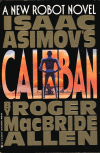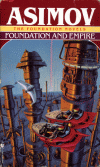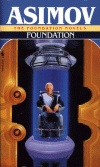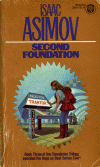I was glad to break into a new series after reading sixteen books with Derec and Ariel as main characters. Roger MacBride Allen brings the robot Caliban to life from “infancy” from when he is first powered up. Caliban awakens with his arm half raised to see the body of a woman laying on the floor, which later turns out to be his creator Fredda Leving. If Caliban was a normal robot he would have sent for help immediately, but unfortunately he was created lacking the infamous Three Laws of Robotics. Instead, Caliban investigates the scene briefly and then ventures out to explore this new unfamiliar world.
The rest of the novel revolves around Caliban’s exploration of the city Hades, on the 49th Spacer colony of Inferno. This planet is unique because Settlers have been brought in to hopefully fix the terraforming project on this planet. Caliban soon finds himself the subject of a “robot bashing” but manages to escape but not without injuring several Settlers in the process. Sheriff Alvar Kresh heads up the investigation to track down this rogue robot which seems to be the only suspect in the attack against Fredda Leving.
I particularly like that Caliban’s thought process in this book isn’t just a bunch of computations and logic like Bogard’s was in the Tiedemann Trilogy (Mirage, Chimera, Aurora). After all, Bogard was only able to shunt Three Law violations. Caliban’s thoughts flow out like you would expect a normal person to think, but just a bit more logical in nature. It is very interesting to see how he evolves as a thinking being over the course of the book. I also enjoyed Freda Leving’s speech in Chapter 14 on the analysis of the Three Laws. I’m also a bit surprised that I still couldn’t remember the ending of this book although I read this before many years ago. All I can say is that the clues are much more visible in retrospect after things start to fall into place. I think this book proves that it doesn’t hurt to read a book more than once, especially if it has been a while.



